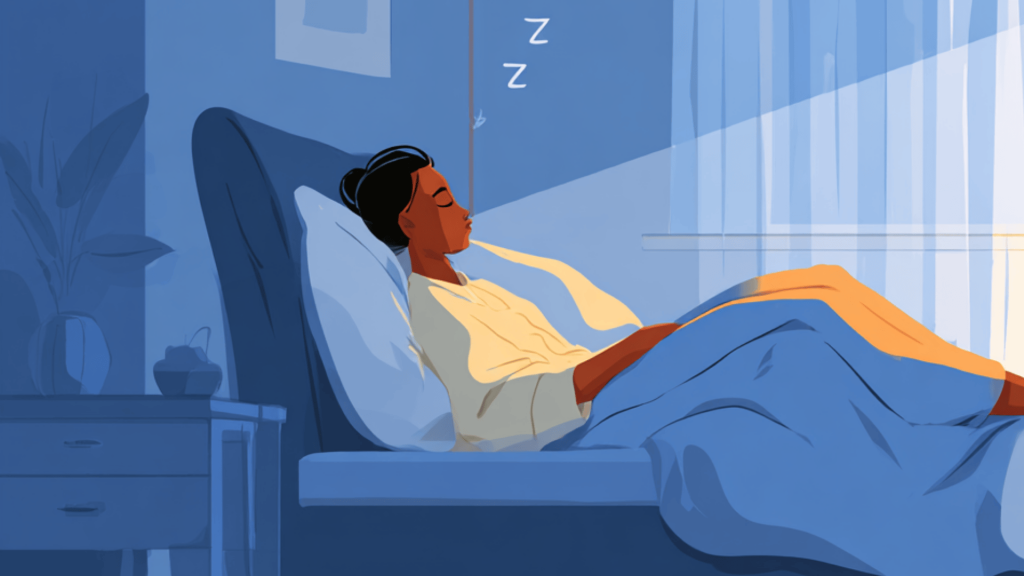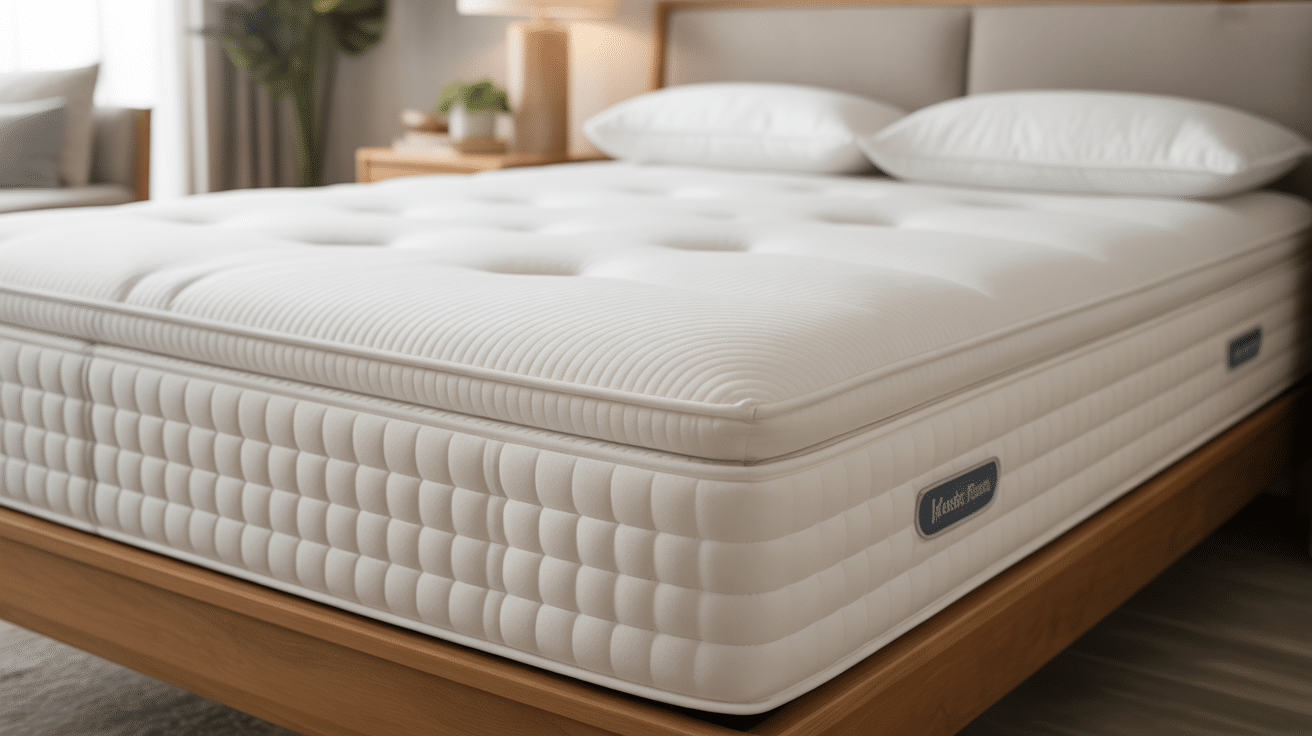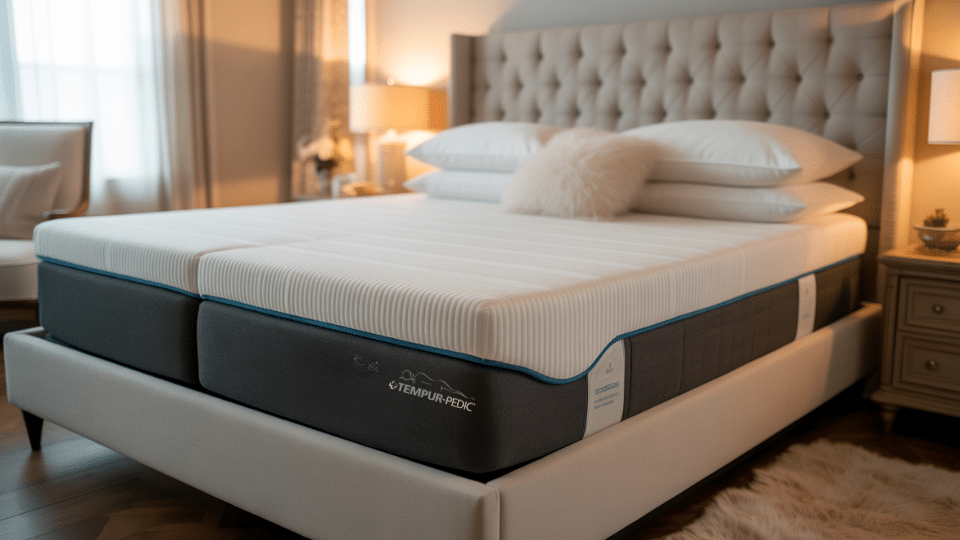Tired of tossing and turning because of nerve pain in your feet or legs? I know how frustrating that can be. Many people struggle to get real rest when they’re dealing with nerve discomfort or damage.
If you’ve been wondering how to sleep with peripheral neuropathy, I’m here to help. I’ll walk you through simple, real-life tips to make bedtime easier, like the best sleep positions, how to reduce pain naturally, and how to create a more relaxing sleep space.
You’ll also learn about helpful nighttime routines, treatment options, and when it might be time to check in with your doctor.
Let’s take the guesswork out of sleep and wake up feeling more rested.
Why is Neuropathy Worse at Night
Many people with peripheral neuropathy find that their pain gets worse at night. This can make it hard to fall asleep or stay asleep. Here’s why that happens:
Nerve Pain and Circadian Rhythms
Your body follows a natural 24-hour cycle called the circadian rhythm. This internal clock controls things like sleep, temperature, and how your body feels pain.
At night, your nervous system slows down, but pain signals can become more noticeable. Without the usual daytime activity, your brain may start paying more attention to these pain signals, making them feel stronger.
Less Distraction, More Perception of Pain
During the day, you’re usually busy with tasks, conversations, and movement. These things help distract your mind from pain.
But when you lie down in bed at night, there are fewer distractions. It’s quiet, you’re not moving much, and your focus shifts inward. As a result, the pain you might have ignored all day becomes more noticeable.
Reduced Circulation and Temperature Drops
When you sleep, your body temperature drops slightly and your circulation slows down. For people with neuropathy, this can lead to cold hands or feet and reduced blood flow to the nerves.
These changes can make burning, tingling, or stabbing sensations feel even worse, especially in your feet and legs.
How to Sleep with Peripheral Neuropathy for Nighttime Relief
The way you sleep can have a big impact on how much pain or discomfort you feel from peripheral neuropathy. The right sleeping position can ease pressure on your nerves and help you rest better through the night.
1. Side Sleeping with a Pillow Between Your Knees
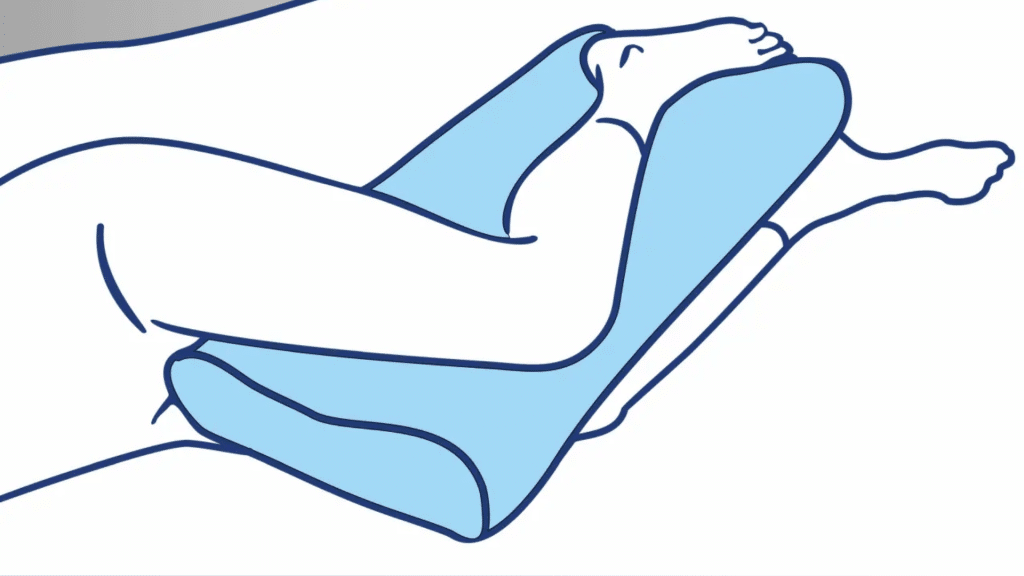
Sleeping on your side is one of the most common and comfortable positions. To reduce strain, place a soft pillow between your knees. This keeps your hips aligned and takes pressure off your lower back and legs, which can help reduce nerve pain, especially in your legs and feet.
2. Back Sleeping with Legs Elevated
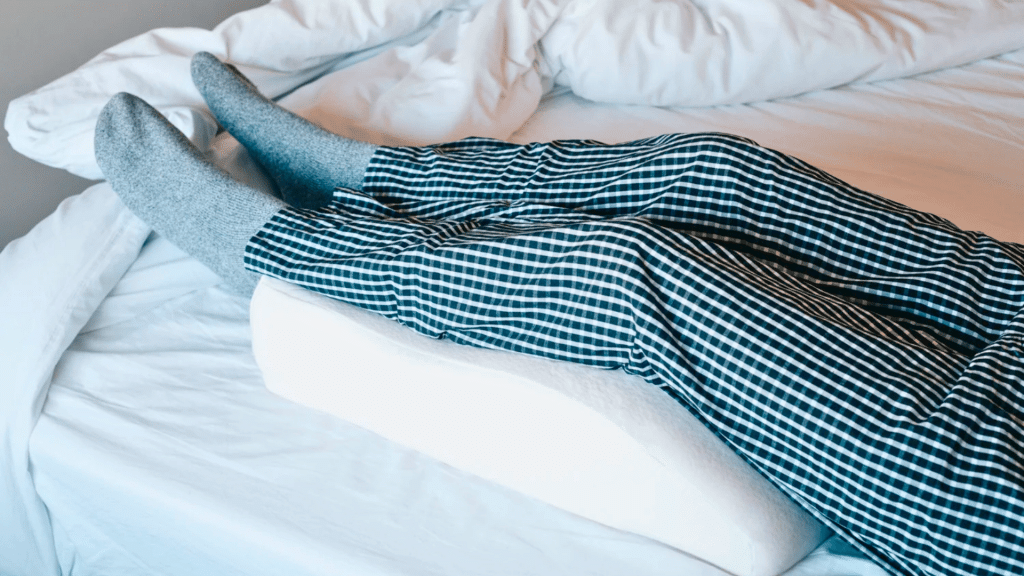
If you prefer to sleep on your back, place a pillow or wedge under your knees. Elevating your legs helps improve blood flow and takes pressure off the lower spine. This can be helpful if your neuropathy symptoms feel worse when your legs are flat.
3. Sleeping in a Reclined Position
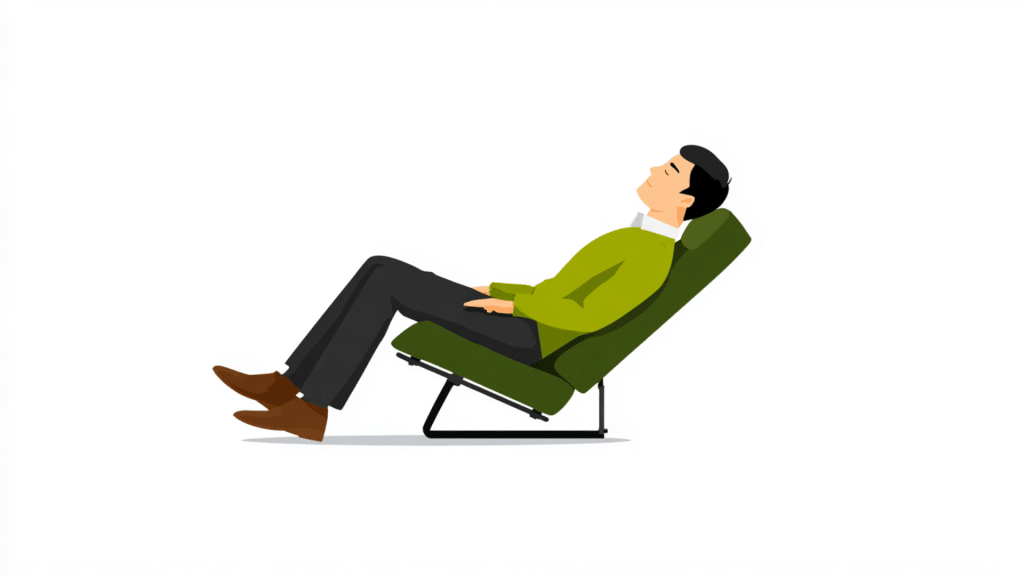
Some people find relief by sleeping in a recliner or using an adjustable bed to stay partially upright. This position can take pressure off the nerves in your lower back and help ease symptoms in your feet and legs. It’s especially useful if lying flat makes your pain worse.
4. Avoid Stomach Sleeping
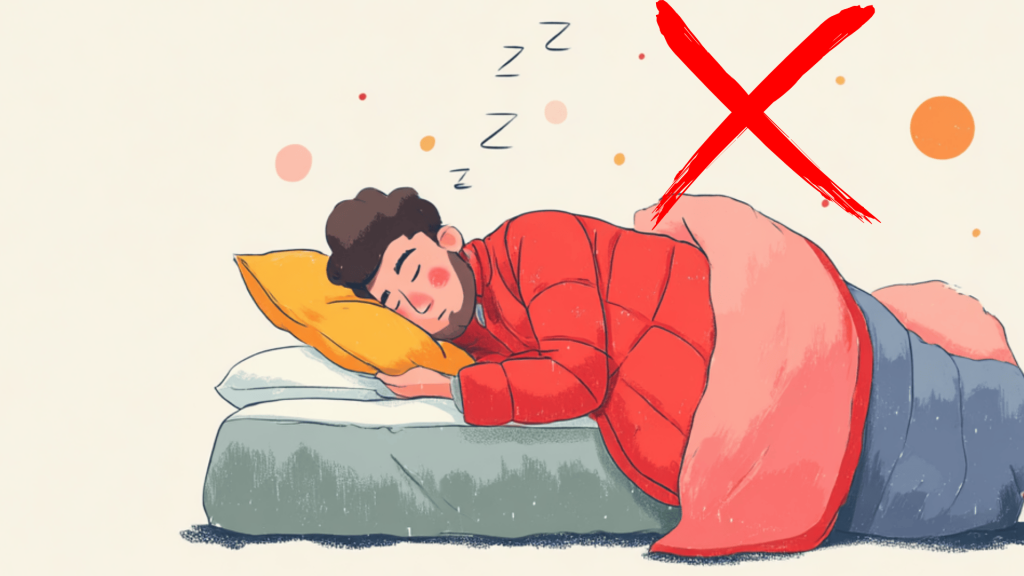
Sleeping on your stomach can twist your neck and spine into awkward angles, which may make neuropathy symptoms worse. It also puts more pressure on your body and may reduce circulation in your arms and legs.
Finding the right sleeping position may take some trial and error. Pay attention to how your body feels in each position and adjust until you find what works best for you.
Creating a Sleep-Friendly Environment
A calm, comfortable space can make it easier to sleep when you’re dealing with peripheral neuropathy. Small changes in your bedroom setup can help ease symptoms and improve your rest.
Temperature, Lighting, and Noise
Keep your bedroom cool, dark, and quiet. Many people with neuropathy feel worse in rooms that are too cold or too hot. The ideal temperature is usually around 18–20°C (65–68°F). This helps regulate your body and nerve function while you sleep.
Use blackout curtains to block light and a fan or white noise machine to mask background sounds. This kind of setup makes it easier for your brain to relax and focus less on pain signals from your nerves.
Bedding and Mattress Tips
The right mattress and bedding can ease pressure on sensitive areas and make a big difference in how you feel at night. A supportive mattress that molds to your body can reduce stress on your spine, hips, and legs.
Try using pillows under your knees or between your legs to take pressure off your lower body. If your feet are very sensitive, a bed cradle can lift the sheets off them, which helps reduce irritation and contact pain.
Creating the right environment sets the stage for better, more restful sleep, even when neuropathy symptoms are active.
At-Home Pain Management Tips Before Bed

If neuropathy pain keeps you up at night, there are simple treatments you can try at home. These methods can help calm your nerves and make it easier to fall asleep.
Topical and Oral Options
Some medications work by dulling the pain signals in your nerves. You can try over-the-counter or prescribed treatments.
Creams like capsaicin or lidocaine can be applied directly to painful areas. They numb the skin or reduce pain signals, which can offer relief for a few hours.
Oral medications like NSAIDs may help if inflammation is part of the problem. If your pain is more severe, your doctor may suggest drugs like gabapentin that work on nerve pain specifically.
Heat, Cold, and Hydrotherapy
Temperature therapy can help soothe irritated nerves. Try these options about 30 minutes before bed.
A warm bath is a great way to relax both your muscles and your mind. If a bath isn’t an option, try heated socks or a warm foot soak. These can improve circulation and ease tingling or burning sensations.
Some people also benefit from cold packs, especially if swelling is present. Just make sure to wrap ice packs in a cloth to protect your skin.
Gentle Movement and Nerve Flossing
Light movement before bed can help calm your nervous system. Focus on slow, controlled exercises.
Stretching your legs, feet, or back can reduce tightness and ease nerve pressure. You can also try gentle nerve flossing, a type of movement that guides nerves through their natural paths to improve mobility and comfort.
Doing a short routine each night can keep your nerves from getting stiff and help reduce pain over time.
Nightly Relaxation Routines
Simple relaxation habits can make it easier to fall asleep and stay asleep, especially when dealing with nerve pain. Try adding one or more of these calming steps to your evening routine.
- Guided meditation apps: These walk you through breathing exercises or calming thoughts. They help quiet your mind and shift focus away from pain.
- Progressive muscle relaxation: This technique involves tensing and relaxing each muscle group, starting from your toes and working upward. It eases body tension and helps you unwind mentally.
- Avoid caffeine, alcohol, and screen time: Stimulants and blue light can keep your brain alert when it should be winding down. Cut these off at least an hour before bed.
- Magnesium supplements or teas: Magnesium can relax your muscles and support nerve health. Teas with chamomile or lemon balm may also help calm your system before sleep.
Even a few small changes to your nightly habits can support deeper, more restful sleep when you’re managing peripheral neuropathy.
Lifestyle and Medical Support
For long-term relief from peripheral neuropathy, you may need to go beyond nighttime routines. Daily habits and professional treatments play a big role in managing symptoms and improving sleep.
Diabetic Neuropathy and Blood Sugar Control
If you have diabetic neuropathy, keeping your blood sugar in a healthy range is essential. High or fluctuating blood sugar can damage nerves over time. Staying consistent with your meals, activity, and medications can help reduce nerve pain and slow its progression.
When to See a Doctor
At-home care doesn’t always do the trick. If your pain is getting worse, keeps you awake night after night, or affects your daily life, talk to your doctor. They can recommend prescription medications, refer you to a specialist, or suggest other options based on your symptoms.
Alternative Therapies
Some people find relief through treatments outside of standard medication.
Acupuncture may help calm nerve signals. Physical therapy can improve strength and mobility, while neurostimulation treatments may reduce how your nerves send pain signals to the brain. These options may be worth checking out if other methods aren’t working well.
Managing neuropathy is often a team effort. Combining healthy daily habits with expert guidance gives you a better chance at lasting relief and better sleep.
Wrapping Up
Getting better rest with nerve pain isn’t always easy, but it starts with small, thoughtful changes that support your body. Now that you know how to sleep with peripheral neuropathy, you can start building a nighttime routine that actually works for you.
Try the tips that feel doable, whether it’s changing your sleep position, using pain relief techniques, or creating a calming space before bed. I’ve found that consistency is key, and patience goes a long way, too.
Everyone’s experience with neuropathy is different, so don’t be afraid to adjust as you go. Keep paying attention to what helps most.
Want more simple, real-life advice like this? Read my other blogs for helpful ideas to feel better and sleep easier, one night at a time.


